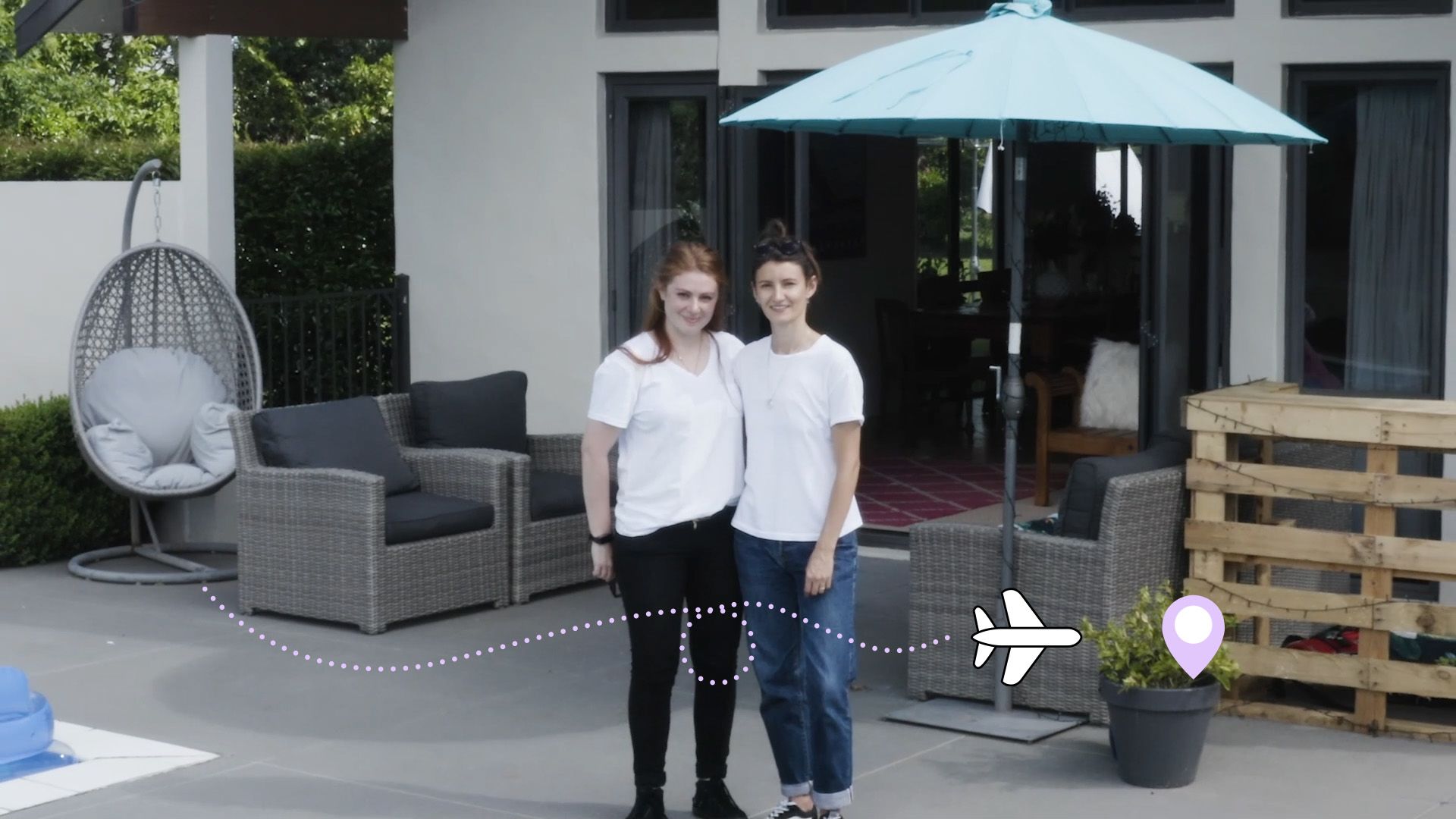

In April 2020 New Zealand shut its borders to keep Covid out. At the same time, confronted with the pandemic, the prospect of an economic meltdown and growing political uncertainty, thousands of Kiwis living overseas chose to come home.
But, getting home was never going to be easy.
No Place Like Home follows six couples as they return to New Zealand to rebuild their lives, often from scratch. Their stories are in turn uplifting, challenging, heart-breaking and joyful.
After all those years spent abroad, many of them must now rediscover where and what home actually is.

Olivia and Lucie

Olivia (right) left Cambridge, New Zealand when she was 17 to travel overseas. She’s now in her late 20s, married, and lives in London. At the same time as Covid is wreaking havoc across the UK, back home her mother, Tracey, is diagnosed with a rare form of cancer.
Olivia and her British wife Lucie return to New Zealand to care for Tracey in her final months. While working remotely they plan for Olivia’s younger sister’s wedding, and try to conceive their first child.

Laura and Josh

Laura and Josh, teachers in their mid 20s, spent years scrimping and saving for their big OE. That wasn’t easy to do on their meagre teachers’ salaries. So, when they finally manage to leave New Zealand they are in no rush to return. But, after a brief stint overseas, their international travel dreams are ruined by Covid. After a precarious escape from France, they make it back home.
Instead of settling down they decide to continue their travels in New Zealand. They buy and refurbish a bus, nicknamed “Rona” and travel around the country. How long can their sojourn last, given they also want to start a family?

Joanne and Andrew

Joanne is an internationally successful educationalist and entrepreneur. Before Covid she was happily settled in Seattle with her American husband Andrew. Both are in their 50s.
But, around the same time as Covid engulfs the US, Joanne’s mother falls gravely ill. With Covid out of control and political tensions at boiling point Joanne and Andrew (who has never previously left the US) travel to New Zealand to be with her mother in her final months.
This, in turn, inspires Joanne to reconnect with her Māori heritage, an identity her mother’s generation was forced to abandon.
Joanne and Andrew buy a large house in Christchurch which they are now turning into an intergenerational home for their extended whānau. That decision is made even more poignant because both Joanne’s sister and brother suffer from a rare degenerative disease which means neither can live on their own for much longer.

Fern and Stefan

Fern and her Brazilian husband Stefan are both accomplished professionals in their early 40s. They live in Nottingham, UK. Fern has a PhD in chemistry and designs smart textiles. Stefan is an international photographer. When Covid hits, they decide to fly back to Fern’s homeland and settle in Whangamatā with their two young children. With neither of their careers a viable option in New Zealand, they try their hand at artisan baking.

James and David

James (left) grew up in Wellington but left nine years ago with his husband David, a diplomat, to follow his dream of becoming a fashion designer. They lived and worked between Paris, Brussels, London, and Geneva. But, after Covid brings life in Europe to a standstill and balancing lockdowns, marriage and careers takes its toll, the couple move back to Wellington.
The accomplished professionals find themselves living with James’ parents.
We follow James as he starts a new fashion business from a spare room. At the same time the couple are renovating a dilapidated old house that they bought, sight unseen, before returning to New Zealand.

Richard and Alison

Richard, 65, is a retired radiographer, and Alison, 61, a semi-retired doctor. Both UK citizens, they had lived in New Zealand in the 1990s but returned to the UK to care for Alison’s aging parents after Alison’s brother, a policeman, took his own life.
They immigrate to New Zealand in 2020 to escape what they - both NHS workers - describe as “the UK’s increasingly populist politics and its shambolic response to Covid”.
Living on an idyllic off-grid property in Martinborough with sheep and alpacas to keep them company, they love their new life here. But they also suffer from “survivor’s guilt” over leaving the NHS at the height of the UK Covid outbreak.
Their peaceful life is disrupted when Alison, who works part time as a GP in Martinborough, must return to the UK to care for her ailing mother.



Why? Because the chaotic start to 2021 has underscored the catastrophic effects of misinformation. Inflammatory rhetoric left unchecked - and amplified across social platforms - has harmed how countries have responded to the pandemic, and has damaged democracy.
Stuff’s ethical reporting is built on accuracy, fairness and balance. With millions of New Zealanders turning to us every day, it’s our mission to make Aotearoa a better place.
But the way journalism is funded is changing and we need your help to sustain local newsrooms.
If Stuff is a regular part of your day, please consider becoming a supporter. You can make a contribution from as little as $1. Be part of our story, and help us tell yours.








